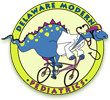Health Maintenance > Autism Screening
Autism Screening
We now realize that 1 in 150 children has an autism spectrum disorder. So finding and starting treatment for these children is worth our attention.
Early child development can be divided into four areas: Motor development (both gross motor and fine motor), communication, social/emotional skills, and cognition (problem solving). Pediatricians have been trained to check on their patients’ development in these four areas at each well checkup; this process is called “surveillance.” These observations, together with the parents’ concerns about developmental progress, will identify many children with developmental disabilities. Referring such children for treatment has been shown to help them develop better. However, the earlier these children are identified and referred, the more effective the treatment is.
Pediatricians are accustomed to using screening tools for medical issues. Most pediatricians routinely screen for anemia, tuberculosis, and lead poisoning, for example.
A developmental screening tool is a questionnaire, administered by the pediatrician or the office staff, asking a series of questions about the child’s development. There are many such tools available; the Policy Statement lists at least 20. Each tool has strengths and weaknesses, and not all are appropriate for general pediatric private practices. The AAP recommends that pediatricians supplement their developmental surveillance and parental concerns, by administering a “screening tool” routinely. We ask parents to complete a "PEDS" Screening form at every child’s 9 month, 18 month, and 24-30 month visit.
In addition, it is important for a pediatrician to listen carefully to parents’ concerns about development. Often, parents will be uneasy about their child’s development, before specific developmental landmarks are missed. Being alert to these cues helps bring such a child to more effective treatment.
Children with autism spectrum disorders show delays in speech and social skills, more than in motor skills. Here are some early red flags that I suggest parents be alert for:
· Does the child give you a free and easy social smile?
· Does the child cuddle and snuggle freely with the parent at quiet times, as opposed to clinging?
· Does the child make eye contact when interacting with the parents?
· Does the child respond to his/her name?
· Does the child seem not to respond to obvious sounds and voices, but respond more to faint or irrelevant ones?
· Is the language progressing like that of other same-age children?
· Does the child seem to have lost some developmental skills around 18-24 months?
Excellent information for parents is available on the AAP’s website (click here).
To see a list of Autism evaluation programs in our area, click here.
-- David Epstein, MD



